- Home
- Chris Petit
The Passenger Page 4
The Passenger Read online
Page 4
‘I don’t know. I never met her.’
‘So how do you know about her? Did your boy tell you?’
‘I heard them in his room.’
‘Heard them how?’
‘Passing his door.’
‘What were they talking about?’
‘They weren’t talking.’
Parker smirked. Collard knew what he was thinking. He remembered standing in the hotel corridor, transfixed by the sound of the girl’s moans.
Sheehan stood up and leaned over Collard.
‘Damn it, man! Why didn’t you tell us?’
For the first time, Collard felt that Sheehan was confiding in him.
‘What’s the problem? He had a girl in his room.’
Sheehan sat back down. He looked sober and exhausted. ‘It’s how they work. They use innocent, gullible young people.’
‘You don’t know Nick. She was just a girl in his room.’
‘Don’t be obtuse, Mr Collard. We’re talking about nearly three hundred lives destroyed by a bomb.’
‘That has nothing to do with my son.’
Sheehan stared at him, challenging.
‘Ask the young Irish woman who was persuaded by her Syrian boyfriend to carry a package for him. On that occasion a planeload of passengers was very lucky the Israelis were on the job.’
‘Nick is an ordinary middle-class English boy.’
‘And she was an ordinary young Irish woman. I’m not talking about your son’s character. I’m talking about whether he was used.’
Collard was rattled. He barely knew where Nick had been in three months. They had spoken only four or five times – calling was expensive and lines were hard to get. A postcard from Bucharest had taken over a week to reach him.
‘OK,’ Sheehan said, ‘from the top. You met your son at the airport the day before the flight.’
Collard had booked a room at the Sheraton airport hotel for them to share but Nick insisted on his own, saying he wasn’t a child. The underlying accusation was that Collard was too mean to pay for an extra room.
‘How did your son seem, generally?’
‘He was tired from travelling. We got off on the wrong foot.’
‘Just the usual family stuff?’ Sheehan was friendly again.
‘You could say.’
‘Did he mention meeting anyone on his travels?’
‘I wouldn’t expect him to.’
‘You weren’t close?’
‘It was up to him to tell me if he wanted to.’
‘Maybe he thought you weren’t interested.’
‘I suppose the tension was about Nick wanting to be with the girl and not subjecting her to an awkward dinner with his boring father.’
They had eaten in the Sheraton restaurant, the two of them. Nick laughed, saying as he rolled his bread into pellets, ‘It’s just a crappy airport hotel, Dad.’ Afterwards he had gone to Nick’s room to ask if he wanted a drink and heard them. The next day he could smell the girl on Nick. He wanted to spoil his secret by saying he knew about her and it didn’t matter, but he hadn’t because he thought he would end up embarrassing them both.
‘Has your son had a lot of sexual experience?’
Collard had no idea. He’d met a couple of London girlfriends. Sheehan wanted to know what they were like. Ordinary middle-class North London girls, was the answer.
‘There was nothing extreme about them?’
Collard didn’t understand.
‘Politically extreme.’
‘I know my son, Mr Sheehan.’
‘That’s as maybe. These are not pleasant speculations. The way it usually works is they use a patsy to carry a gift-wrapped package for delivery at the other end. If anything goes wrong the dupe gets arrested and if the operation is successful the dupe gets the blame. The question is if your son was the dupe how did he know to get off the plane?’
Collard couldn’t care less about Sheehan’s accusations. He knew Nick would never get involved in anything like that. He wanted to be alone to savour the possibility of Nick being alive.
Sheehan seemed to relent. ‘We need to talk to him so we can cross him off the list. Where do you think he is?’
Collard had no answer. Nick was impetuous but would he really run off and not tell anyone or call? He wondered what his pierced ear was meant to indicate.
‘Go get your wife, come back here and we can start to find your son.’
School friends. Relatives. Friends of friends. Favoured locations. Old holiday sites. Sheehan ticked them off his fingers.
‘I’ll find him,’ said Collard.
Charlotte wasn’t at the hotel. Her hire car was gone. Then he saw her letter. His name on the envelope looked considered and ominous. Everything had become so fragile it seemed death could snatch them at any moment, or hand them back on a whim, the crueller the circumstances the better. Collard feared Charlotte would be found dead in the sealed car, with a tube fed in from the exhaust just as he had learned Nick might have been spared.
Instead, Charlotte wrote that she had gone away to be alone for a while, to start to come to terms with losing Nick.
Collard was angry with her for slipping off and unnecessarily extending her grief. He resented too the undercurrent of blame; when it came to that he was quite capable of punishing himself. Once, the mystery of the girl in Nick’s room would have been something they would have shared. Now telling her was inconceivable.
He phoned around London to see if anyone had heard from Nick and left a message at Charlotte’s number in New York in case he had turned up there. He called the house in London and checked his answerphone in case Nick had left him a message. None of the calls led anywhere, but, for the first time, he truly believed Nick was alive.
The Reporters
Charlotte’s whereabouts was less of a mystery. She had been to the Isle of Lewis as a child and often talked of going back. It seemed the obvious choice.
Collard took a bus to the town. The mundane journey was a return to reality. He hired a car from one of the big rental agencies and bought several travel guides before reporting to the incident centre as instructed by Sheehan. The room he was sent to was manned by a young constable hardly older than Nick. It was the first time Collard had seen anyone in the investigation underworked. The constable was only vaguely aware he was supposed to take down all the contacts Collard could provide for his son. He wrote in a jerky hand with a leaky biro that stained his fingers. The smudged ink left Collard fearing for the efficiency of the investigation. At least the young policeman said, ‘Is this about the boy who didn’t get on the plane?’
The rest of the day Collard spent telephoning hotels and boarding houses on Lewis. He tried the Kyle of Lochalsh, where the ferry departed, and drew a blank. He widened his search to other islands, still confident. There weren’t many places to stay, and most of them were closed for winter.
Evelyn now kept the best table in the bar, from which he would not be budged. His companion seemed to have been adopted as a mascot, a role she played with some self-awareness. Evelyn only ever addressed her as Stack.
Collard was at the bar when Evelyn called him over.
‘How does it feel to be alive?’
Collard didn’t know how Evelyn knew he had missed the flight, and wasn’t sure how trustworthy the man was. Then he decided he was happy to tell his story, of two lucky escapes.
‘Two magpies,’ Evelyn said with a bark of laughter. ‘One for sorrow, two for joy. You and your son are very lucky. Fate is a strange thing. I would be dead now if I hadn’t noticed my shoelace was undone. Beirut, 1985 – bent down and a bullet smacked the wall where my head had been. What are the chances? Sit down.’
Collard decided to allow himself the luxury of getting pleasantly drunk with them. Little was demanded of him except to listen. Evelyn played up the image of boozy old hack and raconteur. He chain-smoked Silk Cut, coughed phlegm into a silk handkerchief and got angry if anyone tried to put ice in his whisky. Coll
ard wondered if Stack and Evelyn were an item.
That afternoon he had read his first newspaper since the crash, including an article about how the clothes of the dead were being washed by local women volunteers to get rid of the smell of fuel before their return to the next of kin. It turned out Stack had written the story.
‘They’re developing all the film in the cameras they find in the hope of identifying the owners and returning the photographs to relatives,’ Evelyn said. ‘Tomorrow Stack’s talking to the copper in charge of gathering the luggage and trying to match it. Aren’t you, my dear?’
Collard supposed he should make an effort to retrieve his and Nick’s baggage.
‘Fucking awful way to die,’ Evelyn said. ‘Have the tabbies been on to you yet?’
‘Tabbies?’
‘Tabloids. You’d be right up their street: the man who got off. Don’t worry, we shan’t tell, shall we, my dear?’
He squeezed Stack’s arm.
Collard suspected Evelyn was lonely. Stack looked like she wanted to be taken on her own terms but what those terms were was hard to say.
Evelyn lit up. ‘What I can’t work out is whether it’s all bloody obvious – Allah versus the infidel – or something deeper. What do you think? Are you of the deeper school, chummy?’
Collard realized he was being addressed.
‘Everyone’s saying it’s terrorists from the Middle East.’
‘And why would they do something like that?’
‘For the usual reasons, I don’t know.’ Collard had stopped caring.
‘And what are the usual reasons?’
‘Palestine?’
‘You think Palestinians blew up the plane?’
‘They have a history of terrorism,’ Collard said lamely.
‘Do you have anyone else pegged? Iraq, for example?’
‘Stop being a cunt, Evelyn,’ Stack said and turned to Collard. ‘Don’t let him bully you. It’s only because he hasn’t got a clue that he’s taking it out on someone else.’
‘Bollocks to you, my dear. You don’t know what you’re talking about and I do. That plane was bombed as a simple act of revenge. Last July the Americans shot down a civil Iranian Airbus. The plane was full of pilgrims on their way to Mecca – there were 290 people on board, almost exactly the number on Flight 103. Syria put the operation together on behalf of Iran and subcontracted it to a terrorist organization called the Freedom Group for the Liberation of Palestine, operating in West Germany.’
‘And the reason for Syrian involvement?’
‘Strapped for cash.’
Collard had no recollection of the Airbus incident.
‘But why would the Americans shoot down a civil airliner?’
‘The USS Vincennes was patrolling the Arabian Gulf when it picked up a plane flying out of Iranian airspace, which failed to identify itself. After deciding it was a hostile F14 fighter aircraft, the venerable Captain Rogers gave the order to fire two surface-to-air missiles. The Airbus exploded in mid-air, much like Flight 103.’
Collard was struck by the religious angle: the Airbus full of pilgrims; people going home for Christmas.
‘But the Americans must have admitted it was a mistake.’
‘Like hell they did,’ Evelyn snorted. ‘They handed out medals all round and refused to apologize, which was in keeping. The Vincennes was known as “Robo-cruiser” in the Gulf. Personally, I would have apologized.’
Stack snorted back. ‘You never apologize.’
‘If I had just blown a load of innocent Muslims out of the sky I probably would, if only from expediency. The Iranians may have a point.’
Collard protested. ‘How can you say that? There’s no point, just the opposite.’
‘Calm down, calm down. I do not condone coldblooded retaliation. What I am saying is if the Yanks’ diplomatic skills had been more honed they might have saved the lives of those on board Flight 103.’
Collard was surprised by how swiftly things had changed – three days earlier Evelyn had said no one had a clue who bombed the plane. Now, in spite of his apparent inertia, he seemed very well informed. Collard found his theory reassuring. It still sounded very remote and political, and made Sheehan’s aggressive, even desperate, questions seem even more absurd.
The Bombeat
Charlotte telephoned, waking Collard from a deep sleep. She sounded distant and was slow to accept that Nick might be alive.
‘It’s fantastic news,’ he said in an effort to inject some enthusiasm into her. ‘I’m telling you, I’ve seen the passenger list and he’s not on it.’
‘What are you saying?’
She sounded muddled. Collard thought she had been sedating herself.
‘What’s the matter?’
‘Why hasn’t he been in touch? You know he would have called.’
Charlotte, pourer of cold water, as always.
They were cut short because she was in a call box and running out of money. He offered to call back but she didn’t want to talk. Collard sensed she had been about to tell him something but his news prevented her. He hung up, exasperated, and only then realized he could have refuted her definitively with Sheehan’s investigation.
In the breakfast room, Stack was eating alone. She offered him the place opposite her, saying it was too early for Evelyn. She told him not to take offence at Evelyn’s rudeness.
Collard wasn’t sure if he wanted company after the unpleasantness of Charlotte’s call, but he couldn’t bring himself to refuse. He remembered Stack was due to see the collected luggage that morning and thought he might ask for a lift so he could retrieve Nick’s belongings.
‘When’s your son joining you?’
‘Soon, I hope,’ he said and asked about her work.
She told him she had to go to Frankfurt to talk to a contact in the German intelligence services.
‘They’re saying the bomb was put on the plane in Frankfurt. The Germans had the Palestinian cell under observation. They caught the bomb-maker and at least one of the bombs but another slipped through the net. That was what blew up the plane.’
‘They know who made the bomb! Isn’t this news?’
‘It’s too early. They’re waiting for forensic evidence. And they’re in no hurry – it’s not exactly a public-relations triumph that they were watching the cell and still lost the plane.’
Her easy assumptions about what was happening were a long way ahead of him. He wanted to know obvious things such as who organized the cell and whether there was someone you could point a finger at.
Stack offered without prompting, ‘I’m chasing a story on an arms dealer. He has his own bank and jet and his hobby is sponsoring terrorists.’
Collard felt depressed about Charlotte’s call. Stack’s company underlined his lack of anyone to talk to. He wondered if as a reporter she would know how to go about tracing Nick beyond what he had already done. ‘How do I go about finding my son?’
‘What do you mean?’
‘I can’t find him.’
Stack drove him to the warehouse where the possessions of the dead were stored. Sections of the town remained closed off with traffic rerouted. The town was still in mourning, with almost no one out.
After the relief of being able to air his worries about Nick, Collard decided he was being indiscreet talking to a reporter. He didn’t care.
‘This American gave me a rough time over Nick. He tried to scare me with stories about innocent people getting used.’
‘They’re starting to say that about a Lebanese student called Khaled. They think his bag carried the bomb.’
Collard was alarmed by the unexpected mention of Khaled. He thought of the body Sheehan had shown him, and puzzled over how Sheehan was trying to tie Nick in. Thinking of the agitated young man he had seen in the passport queue he wondered if Khaled was naturally nervous or if he’d had some inkling.
He was unprepared for the dead’s belongings. Row after row of luggage, with tables for personal e
ffects – one for watches and another for jewellery, trays for pens and keys, dozens of cameras, some undamaged. Hard fluorescent lighting made everything look over-exposed and defenceless.
The forlorn display took up most of the warehouse floor. Everything there ought to have ended up in the tired ritual of the baggage carousel. After any flight Collard was struck by the temporary confinement of so many separate lives, prior to going their different ways. The crash was a cruel parody of that process: an intensely concentrated and violent dispersal.
Uniformed police manned a checking centre in a wooden garden shed that was set up in the warehouse and looked brought in for the purpose.
Stack signed in first and turned to give him an encouraging wave. He watched her walk down the aisle studying the luggage. The space looked like a bizarre modern exhibition of the kind that wasted columns of newspaper argument. Collard felt the cold of the concrete floor through his shoes. He gave his name and was unsettled to be told he was expected.
Parker came down, complaining that Collard was early.
‘Early for what?’
‘Didn’t anyone call you?’
‘About?’
‘Coming in to locate your son’s belongings.’
Parker sported a severe new haircut, cropped blond stubble like a cornfield after harvest. His breath smelled of Polo mints as he said, ‘You’d be surprised how few people label their bags.’
Parker pointed to the unlabelled luggage and asked Collard to see if either his or his son’s was there. Collard sorted through piles of clothes. A pair of black Levi 501s, size 30, could have been Nick’s but nothing else told him one way or the other. It dawned on him that he had no idea what Nick’s bag looked like, beyond being a rucksack, any more than he could have identified his clothing, other than knowing it consisted of the usual high-street names. He felt ignorant and unobservant. Did he really have so little sense of his son? What he could remember might as easily be in a drawer at home. He actually had no idea. He knew Parker was watching and he felt tested.
Parker was replaced by Sheehan in an aggressive mood. He made Collard look through filing boxes of the victims’ photographs, each set separated by an index card. He wanted to know if any were of Nick.

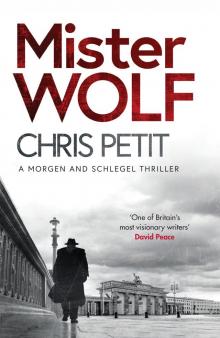 Mister Wolf
Mister Wolf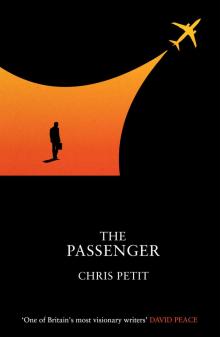 The Passenger
The Passenger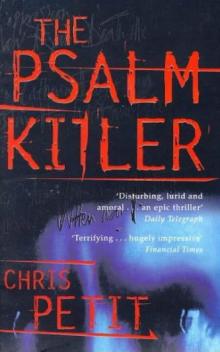 The Psalm Killer
The Psalm Killer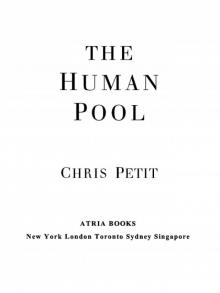 The Human Pool
The Human Pool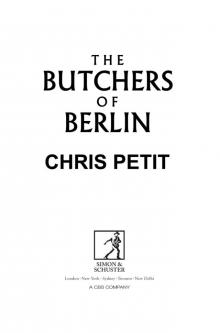 The Butchers of Berlin
The Butchers of Berlin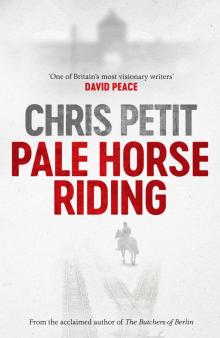 Pale Horse Riding
Pale Horse Riding